Ocean Acidification and Human Health
Ocean acidification, driven by rising carbon dioxide (CO2) emissions, has far-reaching implications for human health. While the direct effects are less pronounced than those on marine life, several indirect consequences can impact human well-being.
Impacts on Seafood Safety and Security
Acidic waters impair the growth and development of shellfish such as oysters, clams, and mussels, making their shells thinner and more fragile. This reduces their ability to protect against harmful bacteria, toxins, and contaminants, posing risks to human consumers. Acidification can also disrupt marine food webs, altering fish populations and the availability of fishery resources, which can affect coastal communities dependent on seafood for nutrition and income.
Disruption of Marine Ecosystems and Coastal Protection
Ocean acidification leads to the degradation of coral reefs and other marine habitats. Coral reefs provide essential coastal protection by buffering against storm surges and erosion. Their decline increases vulnerability to coastal hazards, threatening human settlements, infrastructure, and the safety of coastal communities.
Economic Implications
The loss of vibrant marine ecosystems can negatively impact ecotourism, a major source of income for many coastal communities. Reduced tourism leads to economic hardships for individuals reliant on this sector. Additionally, shifts in fish populations and decreased shellfish yields disrupt fishing and aquaculture operations, resulting in financial losses and diminished food security.
Mental Health and Well-Being
The decline of marine ecosystems and loss of coastal beauty can adversely affect mental health and well-being. Reduced access to nature-based recreational activities and the degradation of culturally significant coastal environments can contribute to stress, anxiety, and a diminished sense of place, particularly for communities closely tied to the ocean.
Mitigation and Adaptation Strategies
Addressing the human health impacts of ocean acidification requires mitigating its root cause: carbon emissions. Transitioning to cleaner, sustainable energy sources is critical to reducing further acidification. Additional efforts should focus on monitoring acidification, developing adaptive management strategies, and promoting sustainable fishing and aquaculture practices that consider changing ocean conditions.
Conclusion
Although direct effects of ocean acidification on human health are limited, its indirect consequences are significant. From seafood safety and food security to coastal protection, livelihoods, tourism, and mental well-being, the impacts of acidification on marine ecosystems have far-reaching implications for human societies. Urgent action to reduce carbon emissions and mitigate ocean acidification is essential to safeguard both marine life and human health in the face of this global challenge.

